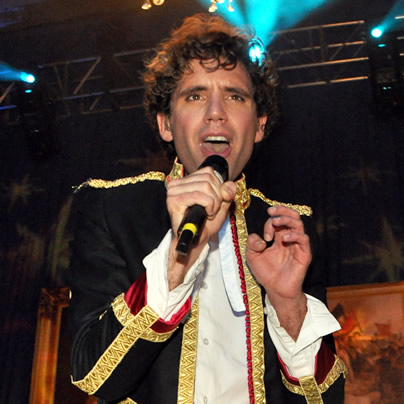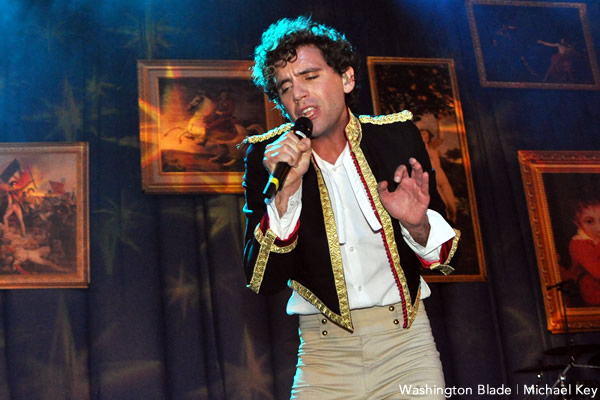Arts & Entertainment
Stripped-down Mika
Out singer brings three-man combo for D.C. tour stop


Mika returns to Washington next week. His show at the Historic Sixth & I Synagogue is sold out. (Washington Blade file photo by Michael Key)
Mika
Wednesday, 8 p.m.
Sixth & I Synagogue
600 I St., N.W.
SOLD OUT
Sixthandi.org
Bit.ly/mikaofficial
Gay pop singer Mika was in Vancouver when we spoke by phone two weeks ago. He was in tour rehearsals for a stripped-down 17-date mini tour behind his latest album “The Origin of Love,” which dropped in October.
There’s good news and bad — he is coming to Washington but the show is sold out. He’s slated to be here Wednesday night for a show at the Historic Sixth & I Synagogue. A review of his March 27 show at Los Angeles’s El Rey Theatre drew raves. A blogger (Neon Tommy) said he spent much of the evening at the piano and, “as great as his voice may sound in recordings, it is unbelievably smooth live” and “beyond impressive.”
WASHINGTON BLADE: What kind of instrumentation will you bring?
MIKA: There are three of us playing everything from piano to clarinet to sax to accordion to marimba to vibraphone — we have all these different instruments being played and we’re trying almost to make it sound classically influenced almost. We’ve done some scoring on a lot of this stuff just for this tour.
BLADE: How do you take highly produced dance pop and make it work with that kind of instrumentation?
MIKA: You take it back to the way it was written, to its most essential things. Things start out very basically, like maybe just piano and bass, and then build and build until you get the more dance stuff. But there’s loads of different ways to do it. It almost sounds more tribal on stage. It’s kind of like you’re getting people up and dancing and singing without all the bleeps and blowups.
BLADE: Is this where you are musically now or is it just a way to contrast it with the touring you did last fall?
MIKA: It definitely will affect the sound of my next record. We’re testing new songs and it’s already happening. The new stuff is a lot more sparse.
BLADE: The transition in your vocals from your natural range into falsetto is so seamless. With many singers it’s so much more pronounced. Was that just always the way it was or have you worked to develop and refine that?
MIKA: It’s really the result of growing up being trained by Russian classical musicians. It was like really serious professional singing. I can flip really effortlessly because I’ve been doing it since I was about 11. At the same time, my full voice range is actually quite limited. I’m technically a baritone, so pop just doesn’t work for that kind of voice and I had to develop a way to have more range. If you listen to Freddie Mercury or Prince, you see how we try to stretch it as far as you can and make it so it’s almost unnoticeable.
BLADE: Now that you’ve been out a while, what differences have you noticed career-wise?
MIKA: There’s been no change whatsoever in the people coming to the shows. It’s exactly the same demographics … I have always had this very crazy mix. Press wise, people talk about it, but it’s only one question that comes and goes because I’ve never lied or pretended to be anything I wasn’t. I refused to label myself. And the music hasn’t changed. Beyond that, I think there’s definitely a different sort of person now who comes up and talks to me on the street. That happens in a very different way. I think it’s made me slightly more approachable to some people.
BLADE: Are you in a relationship now?
MIKA: Yes I am but it’s hard. Beyond the traveling, this desire to constantly be creating … I think takes its toll on a relationship. … Relationships are about stability and that isn’t necessarily the most conducive thing to the creative process.
BLADE: You have such great hair — any tips?
MIKA: Wow, relationships to hair — that’s quite a change.
BLADE: Well, I’m trying to move fast.
MIKA: The hair thing, I don’t know. I hate washing it. I feel like you lose a bit of your brain or something every time you wash it.
BLADE: How often do you wash it?
MIKA: Maybe like once a week or something. It’s kind of skanky.
BLADE: How easily do the hooks come? Is there a large discard pile of songs that just aren’t hooky enough or can you make the hooks tighter as you write and tweak?
MIKA? With the last record I think I wrote 16 or 17 songs and I put out 15 so no, there’s not a lot of waste. It’s a very efficient writing process. I try to write like a child, to write as someone who’s allowing himself to be a child. I don’t really chase hooks, but I try to capture that feeling of being an 8- or 9-year-old girl or boy on a holiday. … I’m obsessed with the craft of thrill building.

The fifth annual Fredericksburg Pride march and festival was held on Saturday, June 28. A march through the streets of downtown Fredericksburg, Va. was followed by a festival at Riverfront Park.
(Washington Blade photos by Michael Key)



















India
Anaya Bangar challenges ban on trans women in female cricket teams
Former Indian cricketer Sanjay Bangar’s daughter has received support

Anaya Bangar, the daughter of former Indian cricketer Sanjay Bangar, has partnered with the Manchester Metropolitan University Institute of Sport in the U.K. to assess her physiological profile following her gender-affirming surgery and undergoing hormone replacement therapy.
From January to March 2025, the 23-year-old underwent an eight-week research project that measured her glucose levels, oxygen uptake, muscle mass, strength, and endurance after extensive training.
The results, shared via Instagram, revealed her metrics align with those of cisgender female athletes, positioning her as eligible for women’s cricket under current scientific standards. Bangar’s findings challenge the International Cricket Council’s 2023 ban on transgender athletes in women’s cricket, prompting her to call for a science-based dialogue with the Board of Control for Cricket in India and the ICC to reform policies for transgender inclusion.
“I am talking with scientific evidence in my hand,” Bangar said in an interview posted to her Instagram page. “So, I hope, this makes an impact and I will be hoping to BCCI and ICC talking with me and discussing this further.”
On Nov. 21, 2023, the ICC enacted a controversial policy barring trans women from international women’s cricket. Finalized after a board meeting in Ahmedabad, India, the regulation prohibits any trans player who has experienced male puberty from competing, irrespective of gender-affirming surgery or hormone therapy. Developed through a 9-month consultation led by the ICC’s Medical Advisory Committee, the rule aims to safeguard the “integrity, safety, and fairness” of women’s cricket but has drawn criticism for excluding athletes like Canada’s Danielle McGahey, the first trans woman to play internationally. The policy, which allows domestic boards to set their own rules, is slated for review by November 2025.
Bangar shared a document on social media verifying her participation in a physiological study at the Manchester Metropolitan University Institute of Sport, conducted from Jan. 20 to March 3, 2025, focused on cricket performance. The report confirmed that her vital metrics — including haemoglobin, blood glucose, peak power, and mean power — aligned with those of cisgender female athletes. Initially, her fasting blood glucose measured 6.1 mmol/L, slightly above the typical non-diabetic range of 4.0–5.9 mmol/L, but subsequent tests showed it normalized, reinforcing the study’s findings that her physical profile meets female athletic standards.
“I am submitting this to the BCCI and ICC, with full transparency and hope,” said Bangar. “My only intention is to start a conversation based on facts not fear. To build space, not divide it.”
In a letter to the BCCI and the ICC, Bangar emphasized her test results from the Manchester Metropolitan University study. She explained that the research aimed to assess how hormone therapy had influenced her strength, stamina, haemoglobin, glucose levels, and overall performance, benchmarked directly against cisgender female athletic standards.
Bangar’s letter to the BCCI and the ICC clarified the Manchester study was not intended as a political statement but as a catalyst for a science-driven dialogue on fairness and inclusion in cricket. She emphasized the importance of prioritizing empirical data over assumptions to shape equitable policies for trans athletes in the sport.
Bangar urged the BCCI, the world’s most influential cricket authority, to initiate a formal dialogue on trans women’s inclusion in women’s cricket, rooted in medical science, performance metrics, and ethical fairness. She called for the exploration of eligibility pathways based on sport-specific criteria, such as haemoglobin thresholds, testosterone suppression timelines, and standardized performance testing. Additionally, she advocated for collaboration with experts, athletes, and legal advisors to develop policies that balance inclusivity with competitive integrity.
“I am releasing my report and story publicly not for sympathy, but for truth. Because inclusion does not mean ignoring fairness, it means measuring it, transparently and responsibly,” said Bangar in a letter to the BCCI. “I would deeply appreciate the opportunity to meet with you or a representative of the BCCI or ICC to present my findings, discuss possible policy pathways, and work towards a future where every athlete is evaluated based on real data, not outdated perceptions.”
Before her transition, Bangar competed for Islam Gymkhana in Mumbai and Hinckley Cricket Club in the U.K., showcasing her talent in domestic cricket circuits. Her father, Sanjay Bangar, was a dependable all-rounder for the Indian national cricket team from 2001 to 2004, playing 12 test matches and 15 One Day Internationals. He later served as a batting coach for the Indian team from 2014 to 2019, contributing to its strategic development.
Cricket in India is a cultural phenomenon, commanding a fanbase of more than 1 billion, with more than 80 percent of global cricket viewership originating from the country.
The International Cricket Council, the sport’s governing body, oversees 12 full member nations and more than 90 associate members, with the U.S. recently gaining associate member status in 2019 and co-hosting the 2024 ICC Men’s T20 World Cup. The BCCI generated approximately $2.25 billion in revenue in the 2023–24 financial year, primarily from the Indian Premier League, bilateral series, and ICC revenue sharing. The ICC earns over $3 billion from media rights in India alone for the 2024–27 cycle, contributing nearly 90 percent of its global media rights revenue, with the BCCI receiving 38.5 percent of the ICC’s annual earnings, approximately $231 million per year.
Women’s cricket in India enjoys a growing fanbase, with over 300 million viewers for the Women’s Premier League in 2024, making it a significant driver of the sport’s global popularity. The International Cricket Council oversees women’s cricket in 12 full member nations and over 90 associate members, with the U.S. fielding a women’s team since gaining associate status in 2019 and competing in ICC events like the 2024 Women’s T20 World Cup qualifiers. The BCCI invests heavily in women’s cricket, allocating approximately $60 million annually to the WPL and domestic programs in 2024–25, while contributing to the ICC’s $20 million budget for women’s cricket development globally. India’s media market for women’s cricket, including WPL broadcasting rights, generated $120 million in 2024, accounting for over 50 percent of the ICC’s women’s cricket media revenue.
“As a woman, I feel when someone says that they are women, then they are, be trans or cis. A trans woman is definitely the same as a cis woman emotionally and in vitals, and specially, when someone is on hormone replacement therapy. Stopping Anaya Bangar from playing is discrimination and violation of her rights. It is really sad and painful that every transwoman need to fight and prove their identity everywhere,” said Indrani Chakraborty, an LGBTQ rights activist and a mother of a trans woman. “If ICC and BCCI is stopping her from playing for being transgender, then I will say this to be their lack of awareness and of course the social mindsets which deny acceptance.”
Chakraborty told the Blade that Bangar is an asset, no matter what. She said that the women’s cricket team will only benefit by participation, but the discriminating policies are the hindrance.
“Actually the transgender community face such discrimination in every sphere. In spite of being potent, they face rejection. This is highly inhuman. These attitudes is regressive and will never let to prosper. Are we really in 2025?,” said Chakraborty. “We, our mindset and the society are the issues. We, as a whole, need to get aware and have to come together for getting justice for Anaya. If today, we remain silent, the entire community will be oppressed. Proper knowledge of gender issues need to be understood.”
The BCCI and the International Cricket Council have not responded to the Blade’s repeated requests for comment.
Theater
‘Andy Warhol in Iran’ a charming look at intersection of art, politics
Mosaic production plumbs kidnapping plot of iconic artist for humor

‘Andy Warhol in Iran’
Through July 6
Mosaic Theater Company at Atlas Performing Arts Center
1333 H St., N.E., WDC
$70
Mosaictheater.org
Behind the blasé veneer, Andy Warhol was more curious than people knew. Particularly when it came to money. He kept a close eye on how the ultra-rich lived, what fellow artists were being paid and who was paying them, and, of course, all the new and more saleable ways of making and selling art.
In playwright Brent Askari’s “Andy Warhol in Iran,” now playing at Mosaic Theater Company, Warhol (Alex Mills) is brought outside of his usual area of interest when he lands face to face with a young revolutionary. While Warhol could be artistically revolutionary, he didn’t connect with the idea of forgoing the pursuit of money and fame for the infinitely more difficult task of achieving social justice.
The 90-minute play is not fully factual, but rather inspired by Warhol’s real life 1976 trip to Tehran to make portraits of the royal Pahlavi family in the waning days of their reign, with a focus on Farah Diba, the Shah’s elegant wife and Iran’s last empress.
The action unfolds in a Tehran hotel suite boasting a glorious view of the snowcapped Alborz Mountains not far from Iran’s vibrant and bustling capital. It’s here, disguised as room service, that Farhad (played by Nathan Mohebbi) gains entrance to Warhol’s rooms, seeking to kidnap the pop art star to garner attention for the university students’ movement.
Warhol meets the armed intruder with a sort of wide-eyed wonderment, flummoxed why he has been selected for abduction. Warhol can’t understand why a young man like Farhad wouldn’t prefer to be paid a big ransom on the spot, or be cast as a star in one of the Warhol Factory flicks.
When Farhad replies it’s because Warhol is the most decadent artist in the world, Warhol mistakenly takes it for the ultimate compliment. After all, his biggest successes had been connected to celebrity and consumerism (think Campbell’s Soup Cans. 1962).
For Warhol, decadence is aspirational. He made portraits of financiers, movie stars, and jet setters. In fact, he’d been obsessed with the lives of the rich and famous since he was a small kid in Pittsburgh thumbing through Photoplay Magazine while bed bound with Saint Vitus Dance.
Accompanying Warhol to Tehran (unseen) are his business manager Fred Hughes, and Bob Colacello, editor of Interview magazine. Together, they make a merry trio of gay social climbers. These kinds of trips were a boon to the artist. Not only did they solidify a new strata of high society contacts, but were also superbly lucrative, thickly padding the painter’s pockets.
While in Iran, Warhol wanted only to view Farah’s vast world-class collection of jewels, sample the caviar on tap, and get his Polaroids. Then he’d fly first class back to New York and transfer the images to silk screen and sell the portraits to the Persian royals at a hefty price. He didn’t foresee any obstacles along the way.
Serge Seiden’s direction is spot on. He’s rendered a wonderfully even two-hander with a pair of terrifically cast actors. And Seiden plumbs the piece for humor mostly drawn from the absurdity of the situation without missing any of the serious bits.
As Warhol, out actor Mills is instantly recognizable as the eccentric artist. He’s wearing the button-down shirt, jeans, blazer, glasses, and, of course the famed shock of white hair wig (here a little more Karen than Andy). His portrayal is better than an imitation. He gives a bit of the fey and confused, but has also infuses him with a certain dynamism.
The energy works well with the intensity of Mohebbi’s would-be kidnapper Farhad. And while it isn’t a romance, it’s not impossible to think that Warhol might fall for a handsome male captor.
The connection between art and politics is almost always interesting; and though not a super deep dive into the era or the life of an artist, “Andy Warhol in Iran” is a compelling, charming, and sometimes funny glimpse into that intersection.
-

 U.S. Supreme Court3 days ago
U.S. Supreme Court3 days agoSupreme Court upholds ACA rule that makes PrEP, other preventative care free
-

 U.S. Supreme Court3 days ago
U.S. Supreme Court3 days agoSupreme Court rules parents must have option to opt children out of LGBTQ-specific lessons
-

 India5 days ago
India5 days agoIndian court rules a transgender woman is a woman
-

 National4 days ago
National4 days agoEvan Wolfson on the 10-year legacy of marriage equality









